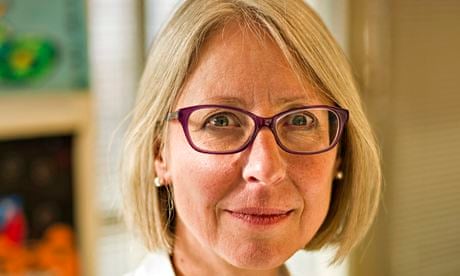In the nine years since I first interviewed Kate Davies, chief executive of Notting Hill Housing Group, she has come a long way. Then she had just taken the helm at one of the leading housing associations in the south-east and was building and managing affordable homes for some of London's poorest people. Now almost one-fifth of Notting Hill's housing portfolio is private rentals and housing for shared ownership, and it is increasingly having to develop high-quality property for wealthy individuals to sell on the open market in order to fund its much-needed social housing.
Davies, 57, relishes the professional independence that funding social housing through commercial property sales now offers following shrinking government subsidy. "If you're entirely dependent on government, that is a feeling of weakness," she says. "You haven't got so much say over what you do; you're simply churning out sausages for the government."
Managing that shift in culture within her organisation, however, has been more of a struggle. In 2010, staff voted to walk out over changes to terms and conditions, including plans to abolish carers' leave.
Was the strike a symptom of the awkward evolution of the social housing sector? "That tension is there," Davies admits. "You could say crudely that the people who are selling homes are in a different quadrant from the people looking after the elderly people with dementia. There are different cultures around Notting Hill. I think that's inevitable.
"When you are doing a lot of commercial work people forget you are also still a charity and are still connected to that social purpose. We don't always advertise enough, in the same breath, that we're both commercial and trying to make the world a better place."
These difficult periods taught Davies important lessons. "[Early in my career] I was a pretty crude manager, quite brutal, rude, crass, unsophisticated in my approach," she admits. "I think in retrospect that [the strike] could have been avoided by me and my senior colleagues dealing with it differently. The basic lesson is: if you involve staff and consult with them and engage them with a problem they will very often come up with a solution themselves. "
Though her management style may have evolved, Davies is still critical of her contemporaries in housing associations who refuse to accept change and commercialisation at every turn. For her "the ends justify the means".
Her embrace of the market has made those same peers question her commitment to social housing: "Let's be very specific. I'm not anti-social housing; I support social housing – there should be more of it. But if there is limited money available for that, what else are you going to do to produce more of it?
"If you can produce low-cost housing for people by doing commercial activity, do the commercial activity. It's all very well to sit there and go 'We won't touch that with a bargepole'. I feel that housing associations have an obligation to meet additional need. That's the key for me, whatever the politics. Question: what have you done in your lifetime to provide more homes?"
Social housing still accounts for 71% of Notting Hill's 25,000 homes. The 68 new-build homes sold at full market prices last year only accounted for 0.2% of the homes it owns.
Its latest big project is the wholesale redevelopment of the Aylesbury estate in south London. It has come under fire from some quarters for its plans to tear down the "brutalist" architecture . After years of neglect, however, Davies says it would be too expensive to renovate it to keep its original character.
All social housing on the estate will be preserved, but the new estate will be more dense to allow private and shared ownership properties too. Davies welcomes the gentrification that home owners and private renters will bring to the area because it increases the value of Notting Hill's asset base, against which it can borrow to build more homes for lower rents. The gentrification and spiralling housing market in London and the south-east have also created the conditions for Davies' next big challenge; providing a new kind of housing tenure for "Generation Rent" – those young people who may never afford to buy their own home.
"Even 10 years ago it was difficult for people to get housed in London, but now it's impossible," she says. "There's no way, on an ordinary salary, you can afford to get housing in London and that has changed everything for young people. It affects our young staff here. There are lots of people living in housing which is unsafe, frightening, dangerous. There are families sharing one room and people sharing bedrooms into their 30s."
So what's her answer? "I would like to be part of creating a private rented sector that has rents that are controlled so that they go up by CPI [consumer prices index] so they are effectively linked to wages."
She contends that her idea may require some government support. It certainly appears to follow in the radical tradition of the association that was born in the 60s in the wake of mass immigration, Rachmanism and TV drama, Cathy Come Home. "The roots of today are in the past," says Davies. "The core idea of Notting Hill, their mission, was to provide homes for low-income Londoners and that's still our mission. It hasn't changed and I don't ever see it will."
Curriculum vitae
Age 57.
Lives West London.
Family Married, three children, two stepchildren.
Education Mount School, York; Beech Lawn College, Oxford; City University, BA in sociology.
Career 2004-present: chief executive, Notting Hill Housing Group; 1999-2004: chief executive, Servite Houses; 1996-1999: director of housing, Brighton & Hove council; 1994-1996: head of housing, London borough of Bexley; 1990-1993: development director, Carr Gomm (supported housing charity); 1980-1990: jobs including development administrator/manger, Carr Gomm; centre manager, Brook (sexual health charity).
Public life Board member, Tavistock and Portman NHS Foundation Trust; board member, Chartered Institute of Housing.
Interests Tailoring and dressmaking.








Comments (…)
Sign in or create your Guardian account to join the discussion